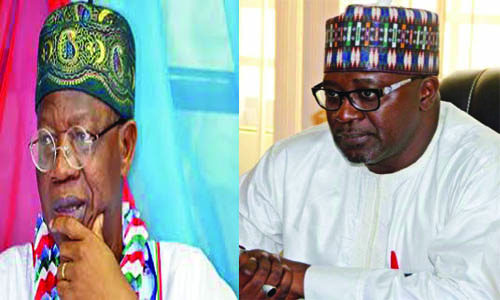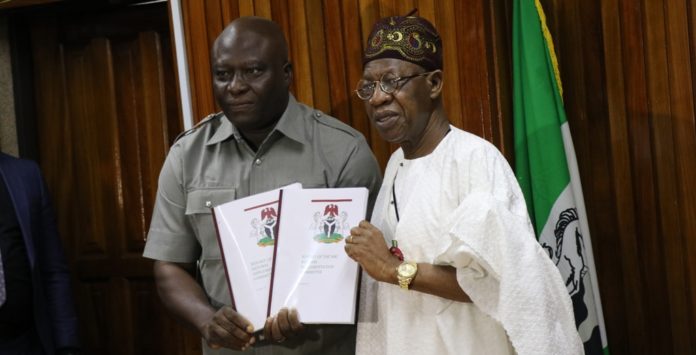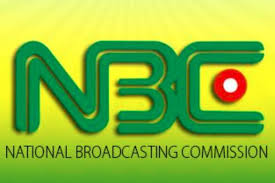Industry experts have started picking holes on the recently submitted Report of the National Broadcasting Commission (NBC) Reform Implementation Committee in Abuja to Minister of Information and Culture, Alhaji Lai Mohammed, following the observed oversight that it failed to make any mention or contribution that will drive the ongoing Digital Switch Over (DSO).
There had been serious reports of paucity of funds to deliver several states’ DSO infrastructures which are yet to be delivered or fine-tuned.
Analysts’ are of the view that what should be uppermost in the mind of the Minister would have been how to source funding and actualize DSO with credible investors than powering a pseudo-parallel administration in the Commission.
Business Hilights recalls that while inspecting facilities at Gospell Digital Technology (GDT) factory at Calabar Free Trade Zone in Calabar recently, the Commission’s Chairman, Alhaji Ikra Aliyu Bilbis, noted that “We have done six states and there are more to it. There are some funds to pay some people who have worked before they can do more into it. There are other administrative paper works to be done which we are battling with.
Leader of the NBC team, Mr. Salihu Bamidele, who represented the Commission Board Chairman, Alhaji Bilbis assured that “As soon as we are able to sort that out as a regulator, it does not take anything for us to release the timetable because we know that by now, we are far behind. I appeal to the operators to work together as a team. Satellite providers have to come together and let us have one voice. They have all to be on the same page and that is part of the delay. The differences we have are administrative differences.”
On when the DSO will take off fully with all the television stations in the country, he further said: “We cannot give any assurance because it involves funds and the NBC does not have the funds and that is why we are appealing to the Federal Government to yield to NBC’s demand so that they can get this thing done. We do not have the money. The money is in billions.

“The white paper is the guideline that guides the operations of the DSO. So, we are trying to make sure that the Act establishing the NBC is reviewed so as to give it a legislative backing,” the NBC chairman averred.
Another point of confusion trailing the new report submitted by Prof Idachaba is how it was arrived at without any form of inputs from the substantive Director General of the NBC, Mallam Ishaq Modibbo Kawu.
While accepting the report submitted by its chairman, Prof. Armstrong Idachaba, who doubles as a director at NBC, Alhaji Mohammed noted that key target of the report is to drive amendment of the Act establishing the NBC to align the regulator with the current realities in the broadcasting industry.
Observers say the none involvement of the Director General of NBC, Mallam Kawu both during the inauguration of the Implementation Committee and even submission of the report clearly shows the efforts of the Minister to sideline the supposed driver of the reforms and further makes nonsense of the entire plan to stand the Commission on a strong footing after all.
However, in insisting that there is need to review the Act establishing the regulatory Commission, the Minister recalled that “Some 27 years into the life of the NBC, there is the need to re-evaluate the applicability of some of its laws. Following the implementation framework presented to me, I will immediately commence the process of forwarding an Executive Bill for consideration of the Federal Executive Council and further legislative action.
“The Bill will address the existing lacuna in the areas of the regulation of the Internet, the ongoing Digital Switch Over, Digital Access Fee, and insulation of the regulator from partisan politics,” he said.
On the mention of ‘ongoing Digital Switch Over (DSO),’ experts say there may be reason to include DSO considering the fact that existing Establishment Act of the NBC is very clear and sacrosanct on its role regarding DSO in the first instance.
Whereas the newly National Broadcasting Code launched in July this year in Kano, has all it takes to tame excesses of broadcasting stations as far as stakeholders are concerned, experts query the rationale behind directing NBC to come up with regulations for the broadcast of content on the Internet and the Web.
He also said that in line with a presidential approval, the Commission has been mandated to amend the Broadcasting Code to reflect the upward review of fines from N500,000 to N5,000,000 for breaches relating to hate speeches, inciting comments and indecency while willful repeat of infractions on three occasions, after levying fine on a station, will attract suspension of license.
The Minister also said the NBC should immediately upgrade the breach of political comments relating to hate speeches and divisive comments to “Class A” offence in the Broadcasting Code.
He said that in order for the NBC to effectively perform its regulatory role in the age of technology and the Internet, the government will immediately commence the process for the acquisition of modern broadcast equipment for the Commission for the purpose of monitoring and enforcement.
Alhaji Mohammed said the NBC is also to immediately come out with fresh regulations that will promote the local broadcast industry and protect the Nigerian broadcast industry from monopolistic tendencies either from abroad or within.
“These regulations are also in the area of advertising tariffs and production of advertisements in Nigeria. The regulations will also ensure that all anti-competitive behaviors are deterred and sanctioned where they occur,” he said.
Additional review of the contents of the Committee Report as submitted by the Committee chairman, Prof Idachaba, shows that the unveiled 2019 National Broadcasting Code (as amended) clearly contained necessary provisions that can take care of the targets of the report, hence, many industry stakeholders’ describe the Committee Report as already contained in the released 2019 National Broadcasting Code as waste of time, resources and parallel running of a government agency upon the existence of a substantial Director General.








